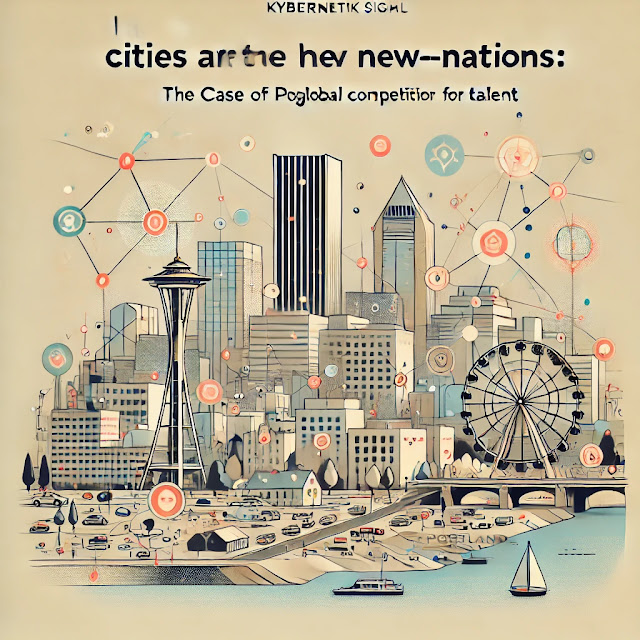In the Decentralized Model, Cities Are the New Micro-Nations: The Case of Portland and the Global Competition for Talent
Introduction
As the world becomes increasingly interconnected and decentralized, the traditional role of nation-states as the primary units of global competition is being challenged by the rise of cities as micro-nations. In this new paradigm, cities are no longer just administrative or economic units within a country; they are now the primary arenas for attracting talent, fostering innovation, and driving economic growth. This essay explores how cities, exemplified by Portland, Oregon, are emerging as micro-nations that must consider all aspects of competition—traditionally managed at the national level—particularly in attracting intelligent and creative individuals.
Portland: A Case Study in Urban Competition
Portland, Oregon, provides a compelling example of a city that has embraced its role as a micro-nation. Known for its vibrant cultural scene, environmental sustainability, and high quality of life, Portland has become a magnet for young professionals, creatives, and entrepreneurs. The city's strategic investments in public infrastructure, including its extensive network of bike lanes and public transportation, have contributed to its reputation as one of the most livable cities in the United States (Florida, 2014).
Portland's focus on sustainability has been a significant factor in attracting talent. The city's green initiatives, such as its ambitious Climate Action Plan and investment in renewable energy, have drawn individuals who prioritize environmental stewardship. This focus on sustainability not only improves the quality of life for residents but also appeals to businesses and startups in the green technology sector, further enhancing Portland's competitive edge (Wheeler, 2017).
Moreover, Portland's emphasis on inclusivity and diversity has made it a desirable destination for young professionals from various backgrounds. The city's support for LGBTQ+ rights, along with its efforts to create affordable housing and equitable economic opportunities, have attracted a diverse population that enriches the city's cultural and intellectual fabric (Bates, 2013). This diversity is a key factor in the city's ability to foster innovation and creativity, making it a powerful competitor in the global marketplace.
Global Examples of City-Led Competition
Portland's success is mirrored by other cities around the world that have adopted a decentralized, city-centric approach to competition. For example, Singapore, often referred to as a "smart nation," has positioned itself as a global hub for technology and innovation. Through strategic investments in education, infrastructure, and technology, Singapore has attracted top talent from around the world, making it one of the most competitive cities globally (Mahizhnan, 1999).
Similarly, Copenhagen has distinguished itself as a leader in sustainability and urban planning. The city's commitment to becoming carbon-neutral by 2025 has attracted environmental professionals and companies specializing in green technology. Copenhagen's integration of urban planning with environmental sustainability has made it a model for cities worldwide, demonstrating how urban areas can compete on a global scale by addressing the challenges of climate change (Jensen, 2013).
In the United States, Austin, Texas, has also emerged as a key player in the competition for talent. Known for its booming tech industry and vibrant cultural scene, Austin has leveraged its quality of life and business-friendly environment to attract skilled professionals and innovative companies. The city's annual South by Southwest (SXSW) festival, which celebrates the convergence of technology, film, and music, is a prime example of how cities can create unique cultural events to draw global attention and talent (Florida, 2014).
Challenges and Opportunities in the Decentralized Model
While the rise of cities as micro-nations offers numerous opportunities, it also presents significant challenges. One of the main challenges is ensuring that cities remain inclusive and affordable as they compete for talent. As cities like Portland, Austin, and Copenhagen attract more skilled professionals, they face the risk of gentrification and rising living costs, which can displace long-term residents and reduce diversity (Bates, 2013).
To address these challenges, cities must adopt policies that promote equitable economic development and protect vulnerable populations. This includes investing in affordable housing, supporting local businesses, and ensuring that all residents have access to high-quality education and healthcare. By doing so, cities can maintain their competitive edge while fostering inclusive and sustainable growth.
Furthermore, cities must continue to innovate in how they attract and retain talent. This includes leveraging technology to create smart cities, developing public-private partnerships to drive economic growth, and promoting cultural and recreational amenities that enhance the quality of life. As cities evolve into micro-nations, their ability to attract and retain the best and brightest will depend on their capacity to adapt to changing global dynamics and address the needs of their residents.
Conclusion
In the decentralized model, cities are increasingly functioning as micro-nations, taking on roles traditionally associated with nation-states. Portland, along with other global cities like Singapore, Copenhagen, and Austin, exemplifies how urban areas can compete on the world stage by attracting talent, fostering innovation, and driving economic growth. However, as cities embrace this new role, they must also address the challenges of inclusivity and sustainability to ensure that they remain vibrant and competitive in the long term. By doing so, cities will not only enhance their own prospects but also contribute to the broader global economy.
References
- Bates, L. K. (2013). "Gentrification and Displacement Study: Implementing an Equitable Inclusive Development Strategy in the Context of Gentrification." City of Portland, Bureau of Planning and Sustainability.
- Florida, R. (2014). "The Rise of the Creative Class—Revisited: Revised and Expanded." Basic Books.
- Jensen, J. O. (2013). "The Copenhagen City of the Future: Green and Healthy." Sustainable Cities and Society, 8, 9-14.
- Mahizhnan, A. (1999). "Smart Cities: The Singapore Case." Cities, 16(1), 13-18.
- Wheeler, M. (2017). "Portland's Climate Action Plan: A Model for Cities Worldwide." Journal of Environmental Policy and Planning, 19(3), 372-385.
This essay outlines the shift towards decentralized urban governance, highlighting how cities like Portland are increasingly operating as micro-nations. It emphasizes the importance of competition and talent attraction in this new model, using global examples to illustrate successful strategies in urban development.












0 Comments